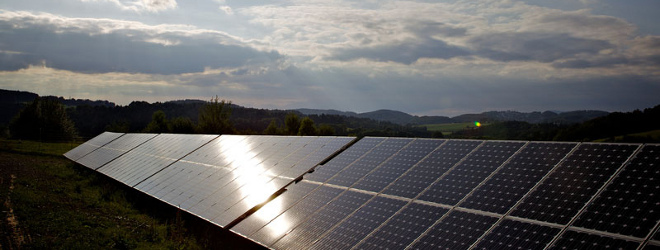Opportunity Snapshot
- Country:
 Ghana
Ghana - Industry: Energy, Natural Resources, Mining
- Stage: Start-up
- Investment size: $100,000,000 / min. $100,000
- ROI: 30% in 5 years
- Type of investment: Debt, Equity
 The Government of Ghana agrees to establish private company partnerships in order ro overcome the existing energy gap. Image courtesy of Windwärts Energie, 2010, Flickr CC.
The Government of Ghana agrees to establish private company partnerships in order ro overcome the existing energy gap. Image courtesy of Windwärts Energie, 2010, Flickr CC.
Investment Opportunity
The project seeks investors to fund a 100 MW solar project and also to invite professional engineers and construction firms to undertake the project.
Background:
We hereby invite you to submit a proposal and estimates for the construction of the above project in Ghana. We received a recommendation from our trade partners in Germany for your unique construction procedures and hope your system will be able to fit our project. Our company is a subsidiary of a liability company incorporated in the United Kingdom, whose business among others is the importation of quality vehicles and selling them to corporate organizations, government agencies and individual transport owners in West Africa.
The company has its Ghana Office in Kumasi, the second regional capital of Ghana and has a trading office in Accra. The company has acquired a 100 acre site where the proposed solar plant will be built with our trade partners to generate power to assist the government to alleviate electricity shortage in the country. The company is registered with an authorized share of 100,000, subscribed and fully paid for.
The combined Akosombo/Kpong system has an installed capacity of 1,180 MW. Kpong has minimal storage capacity and is therefore operated in tandem with Akosombo as a run-of-the-river plant to optimize water use from the Volta Lake. The joint firm energy output from the Akosombo/Kpong hydroelectric development is about 4,800 GWh. Meanwhile the Long-Term Average (LTA) capability of the two plants is about 6,100 GWh.
In 2012, electricity consumption in Ghana was estimated at over 7.095 billion kilowatts per hour (kWh), while production capacity was in the region of 6.489 billion kWh. Ghana is in the process of reducing its reliance on hydroelectric power by increasing and expanding thermal generating capacity. Current thermal facilities, also operated by the main energy generator in Ghana, are located at Tema (126 MW) and Takoradi. Additional capacity is planned. The main energy generator is responsible for generation and for the distribution of electricity in the Brong Ahafo, Northern, Upper East and Upper West regions the government of Ghana has promised to double Ghana’s energy generating capacity to 5000 MW of power until 2016.
Competitive Advantage
- Sales to the government and the ministry of energy
- Connection to the national Grid
- Available land over 100 Acres
- Ready market for project
- Tax holiday from Government
Rationale for the deal
Government Policy
The Government of Ghana, seeing the energy shortage in the country agrees to start private company partnerships, so that the energy gap will be breached. This creates stable investment opportunities in Ghana's Energy sector. Some companies signed a memorandum of understanding with the Ghana government in 2013 to build a 1000 MW power plant in Ghana. The “Ghana 1000MW Project” was introduced at the Power Park Concept to enable lower cost of power and faster implementation. This is in addition to the $980 million 400MW Bui Dam project which should be completed by the end of 2013.
An American corporation worked with the Government of Ghana to define potential projects which sought to address Ghana’s inadequate and unreliable power supply.
Feasibility studies on the second phase of another power plant project have begun but the plant is expected to produce about 360 MW of electricity on completion.
An African bank has announced that it will, as part of its support for the US Power Africa initiative, deepen and expand its work in reforming Ghana's energy sector. The bank plans to allocate $3 billion over the next 5 years for energy production, transmission and distribution infrastructure, cross-border power pools, as well as government policy and regulatory reforms.
A Chinese bank has disbursed $188 million to a Chinese oil and gas company for Ghana’s gas infrastructure project. Aside of the above the country need more than 4000 – n5000MW of power to meet the energy need of the country. The government is therefore encouraging private participation to meet the demand.
Use of financing
- The construction of 100 MW grid solar plants
- Importation of equipment
- Feasibility reports
- Initial working capital
- Payment of construction cost
Opportunity for the investor
Equity share holding of 30%
ROI of 30% -40%
Looking for similar investment opportunities